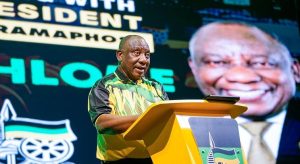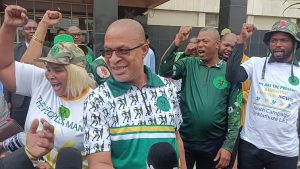Communications authority, ICASA, has said that it will try to consult with other commercial and community broadcasters to carry Public Election Broadcasts (PEBs) should the elections proceed in October.
The regulator was making its oral submission at the Moseneke Commission into the feasibility of holding the local government elections in October during the pandemic.
A number of political parties have mentioned in their submission that they will need assistance in putting out their election messages during the pandemic.
Currently, it is just the SABC that is required to carry the PEBs on an equitable or proportional basis at no cost to the parties.
“To broaden the pool of the pie that will be carrying PEBs because if we try to squeeze an increased number of PEBs which now are more on the same SABC we may have issues and we won’t be surprised if the SABC approaches a court of law to try and challenge what ICASA is trying to impose on them,” says Chairperson of ICASA Keabetswe Modimoeng.
A significant number of political parties want the local government elections to be postponed to early next year.
They made impassioned oral submissions to the Moseneke Inquiry today, citing difficulties in campaigning and candidate selection as a result of the national disaster regulations among other things.
Some parties however are pressing for the October 27 polls to proceed, saying the by-elections have been a good blueprint for what is possible.
Arguing for the local elections to go ahead was the official opposition. The DA said that the IEC has proved during recent by-elections that voting can be carried out successfully in the midst of the COVID-19 pandemic.
“If all the submission by the scientists are taken into account the only three things that can be concluded by this inquiry are the following; one that this pandemic is not going away soon, two that while it is very difficult to predict the further trajectory of the pandemic and most likely path from now until October, is the break between the 3rd and possible 4th wave which would be optimal for campaigning and voting,” says DA MP Werner Horner.
AUDIO: DA’s Werner Horner submission at the inquiry:
Al Jama-ah President Ganief Hendricks has told the inquiry that the poor state of service delivery in many municipalities makes it necessary for the local government elections to go ahead in October this year.
“Present councillors have served their terms. The Attorney -General has said many of them have let their communities down, so if your office recommends that their terms be extended by even one day then this will not augur well by residents who have been harmed and are still being harmed by poor service delivery,” says Hendricks.
AUDIO: Ganief Hendricks says the poor state of service delivery makes it prudent for the LGE to o ahead:
His sentiments were shared by the Patriotic Alliance which has done well in recent by-elections.
On the flip side, the ANC proposed that the elections be postponed by between one to six months from the current date of October 27.
“Level 3 and 4 make election campaigning impossible because there are restrictions on movement. Secondly there is restrictions on numbers. Thirdly there is the fact that democracy and safety have to be regarded both are important elements in any election so the three months have to be an uninhibited 3 months even if it is one and two it is less inhibited than 3, 4 and 5, ” says ANC Deputy Secretary-General Jessie Duarte.
AUDIO: ANC proposes that the elections be postponed by between one to six months:
The ANC has also recommended that the voter registration weekend scheduled for the 17th and 18th of July be postponed by 10 days after level 4 is due to be lifted.
EFF leader Julius Malema also picked up on this issue and supported the deferment of elections to March.
“The heavy lockdown regulations are until the 14th of July so if you release things it means you will have two or three days to mobilize people to register so the registration is the same as the voting day. You must mobilize people to register its very important for them to register because without them registering there is no need to hold elections.” says Malema.
IFP leader, Velenkosini Hlabisa, based his party’s preference for the postponement to May next year on the fact that the party’s constituency is largely rural and disadvantaged.
He says this affects the use of technology and campaigning.
“The reality is that for us to reach our electorate we will be using party leaders and candidates and volunteers. These party volunteers are mostly young people who will be moving from one place to another to get the message to the electorate given the limitations that the state of disaster in place on these actions in the various lockdown levels. We will not be able to freely and fairly campaign” says Hlabisa.
AUDIO: Hlabisa saying IFP prefers a postponement to May next year:
Pan Africanist Congress President, Narius Moloto, has also raised the issue of the COVID- 19 pandemic.
“They can only be favourable to those while they also a political party, they may also be in government in one form or another because when they change the form they are able to communicate to the population or the people and based on the mandate that is political and that creates an imbalance. Those parties that are not necessarily in there will not necessarily be heard,” says Moloto.
AUDIO: Narius Moloto on the COVID-19 challenges:
Oral submissions have been completed at the Moseneke Inquiry, and a final report is expected to be delivered on 21 July.






